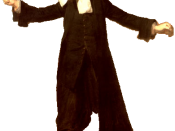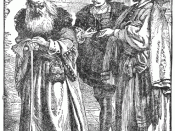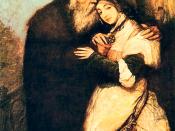Many people are villainous in the way they behave. Their villainous acts may be attributed to their desire to destroy others and in turn elevate themselves to a higher financial or social level. However, the root cause of their villainy may be a response to the treatment they have endured at the hands of others. In short, they have been taught villainy, rather than it being an integral part of their personality. In such instances, revenge can be a key motivator in inspiring them to act in a villainous way. In the 'Merchant of Venice' it can be argued that Shylock is the antagonist, opposite the naïve and essentially good Antonio, the protagonist who must defend himself against the "devil" Shylock. The evil he represents is one of the reasons Shakespeare chose to characterize Shylock as a Jew, as Jews of his time were seen as one with the Devil.
In Italy, where The Merchant of Venice is set, the Jews were being greatly prejudiced against; they were being expelled from the country, they were made to wear demoralizing items such as 'badges of shame' and Jewish synagogues were turned into Christian churches. They were made to wear cloaks, caps or badges that indicated that they were beneath the Christians, and they were condemned to live in just one part of the city, the Ghettos, which were often of bad condition. The only place they were allowed to commune with Christians was on the Rialto where they could do business. The Rialto is where we first meet Shylock. Throughout the play Shylock is criticized because he is Jewish. "Here comes another of the tribe- a third cannot be matched, unless the devil himself turned Jew" (Act 3, Scene 1). This is one of the many quotes that support that Shylock is the victim of the play because others torment him for being a Jew. They treat him like a dog and Antonio has even spit on him.
In Shylock's first scene it, he spends a long time debating whether or not to lend Bassanio the 3000 ducats. The main reason for his delayed response is he likes to have control over the situation, which is not usually the case. He loves the fact that for once Christians need him, a Jew especially. Shylock cruelly takes advantage of his position and keeps Antonio and Bassanio in suspense waiting for his decision, he even goes as far as to pretend he has forgotten the amount they wanted. Shylock is also very two-faced he tells Bassanio how much he hates Antonio. "I hate him for he is a Christian", but to Bassanio he is pleasant "Rest you fair seignior". When Shylock eventually says he will accept the bond, he says he will only lend Bassanio the money if when the 3 months is up and the money is not repaid in full, then he shall have a pound of Antonio's flesh. This would be Shylock's way of taking revenge on Antonio, he says to Antonio' You call me misbeliever, cut throat dog, and spit upon my Jewish gabardine' this seems like a rather excessive extent to go to.
Through most of the play he seems selfish, and it seems in some parts of the play as though he doesn't care about his daughter. While hi is selfish, he sometimes does try and be a good father to his daughter such as in act 2, scene 3. This is where he tells her to lock the house up and to keep safe from the masque, but even part of this act to his daughter was to make sure no Christian men would come into his house to steal anything.
In act 2, scene 8 Salerio and Solanio are talking about the way Shylock reacted to his daughter leaving him. Solanio said that Shylock had said, "My daughter! O my ducats! O my daughter!" This quote makes the audience feel a tiny bit of sympathy for Shylock as it shows how he feels awful about how he has lost his daughter and money at the same time. Solario also goes on to say that Shylock said, "Stolen by my daughter! Justice! Find the girl! She hath the stones upon her, and the ducats!" This quote explains that he only cares about finding his daughter because she has his money and jewels with her and the only way to get it back is to find his daughter.
Overall, the contemporary audience's view would be less prejudiced and more sympathetic towards Shylock than an audience in Shakespeare's time. This is so because now, there is much more religious toleration compared to the past such as Shakespeare's time. Since this play is written from a point of view from Shakespeare's time, Shylock is portrayed more as a villain then a victim. While Shylock was tortured by Christians, this is no excuse in wanting to murder another, even if it was for revenge. Shylock can be considered as a villain not for his religion, but for his personality.
Merchant of Venice by Shakespeare





